
Scientia et Fides
Scope & Guideline
Unlocking Innovative Insights in Philosophy and Faith
Introduction
Aims and Scopes
- Theodicy and Suffering:
Explores the philosophical and theological dimensions of pain, suffering, and evil, particularly in the context of evolutionary biology and Christian theology. - Interdisciplinary Approaches to Evolution:
Investigates the relationship between biological evolution and theological perspectives, including discussions on transhumanism, creation, and the nature of humanity. - Cognitive Sciences and Theology:
Examines the implications of cognitive neuroscience for understanding belief, pain, and the human condition, integrating psychological insights with theological concepts. - Social and Ethical Implications of Science:
Analyzes the moral and ethical dimensions of scientific advancements, particularly in areas like technology, health, and human enhancement, from a Christian perspective. - Historical and Philosophical Reflections:
Engages with historical figures and philosophical debates, addressing how past theological insights can inform current scientific and ethical discussions.
Trending and Emerging
- Transhumanism and Human Enhancement:
A growing interest in transhumanism and its theological implications, exploring how advancements in technology can redefine concepts of humanity, morality, and salvation. - Dynamic Theodicy Models:
Increasing exploration of fluid theodicies that integrate concepts of empathy, emotions, and evolving understandings of God, reflecting a shift towards more adaptable theological frameworks. - Pandemic Responses and Social Ethics:
Emerging discussions on the impact of the COVID-19 pandemic on social control, religious freedom, and ethical considerations, highlighting the relevance of theology in contemporary societal challenges. - Neuroscience and Belief Systems:
A notable rise in papers addressing the intersections of cognitive neuroscience and theology, particularly in understanding pain, suffering, and the nature of belief. - Evolutionary Perspectives on Worship:
An increasing trend towards examining how evolutionary biology can inspire worship and a deeper understanding of divine creation, merging scientific insights with spiritual practices.
Declining or Waning
- Traditional Dualism:
Discussions surrounding substance dualism and its implications for understanding the human person have decreased, as the journal shifts towards more integrative and holistic approaches to personhood. - Historical Theology without Modern Contextualization:
There appears to be a waning interest in purely historical theological debates that do not engage with contemporary scientific or social issues, as the journal increasingly focuses on applied theology. - Static Views on Creation:
The exploration of static or traditional views of creation, without consideration of evolutionary theory or modern scientific insights, has diminished, reflecting a broader trend toward dynamic interpretations. - Focus on Traditional Religious Practices:
The emphasis on traditional religious practices divorced from modern issues, such as social justice or technological advancements, has seen a decline, as the journal seeks relevance in contemporary discourse.
Similar Journals

Logos & Pneuma-Chinese Journal of Theology
Exploring the Intersection of Faith and CultureLogos & Pneuma-Chinese Journal of Theology, published by LOGOS & PNEUMA PRESS, serves as a vital platform for theological discourse and research within the context of Chinese religious studies. Established in 2008 and continuing to contribute valuable insights up until 2023, this journal holds a Q4 ranking in Religious Studies for 2023, illustrating its emerging influence within the field. Although it currently lacks an impact factor and open access options, the journal provides a unique perspective on contemporary theological issues and practices relevant to scholars and practitioners engaging with Chinese Christianity and other religious traditions. It is an essential resource for researchers, students, and professionals seeking to enrich their understanding of the interplay between religion and culture in a rapidly evolving social landscape. Located in the heart of the New Territories, China, the journal invites submissions that reflect a broad range of theological inquiries, encouraging critical engagement and scholarly dialogue.

Perichoresis
Unlocking Insights into Spiritual PracticesPerichoresis is a peer-reviewed academic journal specializing in the field of Religious Studies, published by SCIENDO. Since its inception in 2009, the journal has established itself as a significant platform for scholars exploring various dimensions of religious thought and practice. With an impact factor reflecting its citation metrics and its categorization in the Q3 quartile for 2023, Perichoresis ranks within the 37th percentile among its peers in the Arts and Humanities discipline, specifically in Religious Studies. The journal has embraced open access since 2012, ensuring that high-quality research is readily available to researchers, students, and practitioners worldwide, contributing to the broader discourse within the field. Based in Romania, with an address in Warsaw, Poland, Perichoresis aims to foster an environment of scholarly exchange and innovation, providing valuable insights and diverse perspectives that drive further inquiry and understanding in religious contexts.
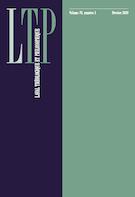
LAVAL THEOLOGIQUE ET PHILOSOPHIQUE
Illuminating Complex Questions in Philosophy and TheologyLAVAL THEOLOGIQUE ET PHILOSOPHIQUE, published by UNIV LAVAL in Canada, is a vital scholarly journal devoted to advancing the fields of philosophy and religious studies. With an ISSN of 0023-9054 and an E-ISSN of 1703-8804, this journal serves as a platform for high-quality research, reflecting the diverse and interdisciplinary nature of theological and philosophical inquiry. Although it is currently categorized as Q4 in both Philosophy and Religious Studies, its dedication to encouraging critical dialogue and innovative scholarship positions it as a significant resource for researchers, professionals, and students alike. From its inception in 2002 to its ongoing contributions, the journal has made a noteworthy impact, fostering intellectual engagement and providing a scholarly space for examining complex philosophical and theological questions. With access options predominantly through institutional subscriptions, it invites a robust academic audience to explore its thought-provoking articles and contribute to the rich tapestry of knowledge within these fields. Set against the picturesque backdrop of Quebec City, this journal embodies the vibrant academic spirit of its locale, aiming to connect scholars from around the globe.
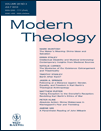
Modern Theology
Shaping Tomorrow's Theological Discourse TodayModern Theology, published by WILEY, is a leading journal in the field of Religious Studies that has been shaping theological discourse since its inception in 1984. With its focus on contemporary theological issues, the journal engages a diverse array of topics, fostering critical analysis and innovative dialogue among scholars, practitioners, and students alike. Boasting an impressive impact factor and ranking in the top 20% within its field (Q1 category), Modern Theology currently holds the distinction of being ranked #139 out of 644 in the Arts and Humanities category related to Religious Studies, placing it in the 78th percentile according to Scopus metrics. The journal provides essential insights and scholarly rigor, making it a vital resource for anyone seeking to deepen their understanding of modern religious thought and its implications for society. Situated in the United Kingdom, the journal does not offer Open Access but remains dedicated to publishing high-quality research that contributes significantly to the ongoing conversation in theology and religious studies. The convergence of scholarly excellence and a global perspective further underscores its importance in academic circles.
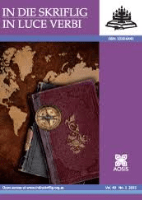
In die Skriflig-In Luce Verbi
Fostering Critical Dialogue in Theology and BeyondIn die Skriflig-In Luce Verbi is a distinguished peer-reviewed journal published by AOSIS, focusing on the intricate relationships between theology, biblical studies, and interdisciplinary perspectives. With an ISSN of 1018-6441 and an E-ISSN of 2305-0853, this Open Access journal has been contributing to scholarly discourse since 1966, ensuring that research in the field remains accessible to a broad audience without financial constraints. The journal aims to foster critical dialogue among theologians, researchers, and practitioners through innovative research articles, review papers, and theological reflections, thereby enriching the academic community's understanding of scriptures and their relevance in contemporary society. Based in South Africa, In die Skriflig-In Luce Verbi plays a pivotal role in promoting sound theological scholarship and offers a platform for diverse voices in the quest for deeper insight into the biblical text.
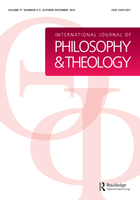
International Journal of Philosophy and Theology
Exploring the Nexus of Thought and FaithThe International Journal of Philosophy and Theology, published by ROUTLEDGE JOURNALS, TAYLOR & FRANCIS LTD, serves as a vital platform for scholarly dialogue at the intersection of philosophical inquiry and theological exploration. With the ISSN 2169-2327 and E-ISSN 2169-2335, this journal aims to advance critical discussions and promote interdisciplinary research, fostering engagement among researchers, professionals, and students alike. Over its publishing span from 2013 to 2024, the journal has made significant strides, achieving a category quartile ranking of Q3 in both Philosophy and Religious Studies for 2023. With a growing impact in the fields of Arts and Humanities, reflected in its Scopus ranks—Rank #357/644 for Religious Studies and Rank #498/806 for Philosophy—the journal is uniquely positioned to influence contemporary debates and foster greater understanding of complex theological and philosophical concepts. Although the journal does not currently operate under an open access model, it remains an essential resource for those interested in deepening their understanding of these critical disciplines, and it continues to uphold its commitment to rigorous scholarship.

INTERNATIONAL JOURNAL FOR PHILOSOPHY OF RELIGION
Charting New Territories in Religious InquiryThe INTERNATIONAL JOURNAL FOR PHILOSOPHY OF RELIGION, published by Springer, is a leading journal dedicated to the rigorous exploration of philosophical inquiries related to religion. Since its inception in 1970, the journal has fostered critical discourse and interdisciplinary research, facilitating dialogues on fundamental questions about belief, ethics, and the nature of divinity. With an impressive 2023 Scopus ranking of 189 out of 806 in the Arts and Humanities category, placing it in the top 76th percentile, this journal is recognized for its scholarly impact and relevance in the field. The journal maintains a prestigious standing as a Q1 journal in Philosophy, making it an essential resource for researchers, professionals, and students seeking to engage with contemporary debates and historical perspectives in the philosophy of religion. Although it does not offer open access, the journal's contributions are invaluable for shaping future inquiry and understanding in this vital area of study.

Studia Theologica-Czech Republic
Advancing Knowledge in Religious StudiesStudia Theologica-Czech Republic is a leading academic journal dedicated to the field of religious studies, published by UNIV PALACKEHO OLOMOUCI. With an impressive Q1 ranking in 2023, it showcases rigorous and innovative research in theology and religious studies. Since its inception, this Open Access journal has been committed to disseminating scholarly articles that explore a broad spectrum of religious phenomena, interpretations, and historical contexts, making it an invaluable resource for researchers, professionals, and students alike. The journal has transitioned from its initial print format to an Open Access model since 2015, allowing for wider accessibility and engagement within the academic community. Operating from Olomouc, Czech Republic, Studia Theologica not only contributes significantly to global discourse in the humanities but also provides a vital platform for interdisciplinary dialogue among theological scholars.

Toronto Journal of Theology
Illuminating Insights in Theology and FaithThe Toronto Journal of Theology, published by University of Toronto Press Inc, is a premier academic journal dedicated to the exploration of theological discourse and religious studies. Established in 1990 and converging its insights from 2011 to 2024, this journal serves as a vital platform for researchers and scholars to publish innovative and impactful studies in the realm of theology. With an impressive ISSN of 0826-9831 and an E-ISSN of 1918-6371, the journal boasts a robust reputation, achieving a Q3 ranking in Religious Studies as per the 2023 category quartiles. It further ranks within the 49th percentile in the Scopus database, positioning it in the midst of esteemed academic discourse. Although it does not currently offer open access options, its rich content and pertinent studies are invaluable to professionals and students alike aiming to deepen their understanding of religious phenomena. As it continues to foster scholarly dialogue, the Toronto Journal of Theology remains a cornerstone for those advancing research in theology and related fields.
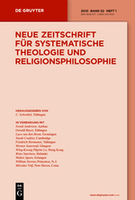
NEUE ZEITSCHRIFT FUR SYSTEMATISCHE THEOLOGIE UND RELIGIONSPHILOSOPHIE
Fostering Critical Thought in Theological StudiesNEUE ZEITSCHRIFT FUR SYSTEMATISCHE THEOLOGIE UND RELIGIONSPHILOSOPHIE, published by WALTER DE GRUYTER GMBH, is an esteemed journal based in Germany that has been providing a forum for scholarly discussion in the fields of systematic theology and philosophy of religion since its inception in 1959. With its commitment to rigorously exploring contemporary theological and philosophical issues, this journal serves as a vital resource for researchers, professionals, and students alike. The journal is indexed and ranked within the Q3 category in Philosophy and Religious Studies, showcasing its relevance in these disciplines, while its Scopus rankings further affirm its academic standing. Although the journal operates without Open Access options, its enduring contribution to academic discourse is invaluable, as it bridges traditional perspectives with modern interpretations in theology and religious studies. Occurring annually, NEUE ZEITSCHRIFT is poised to enrich the academic dialogue up until 2024 and beyond, making it an indispensable publication for those engaged in these dynamic fields.